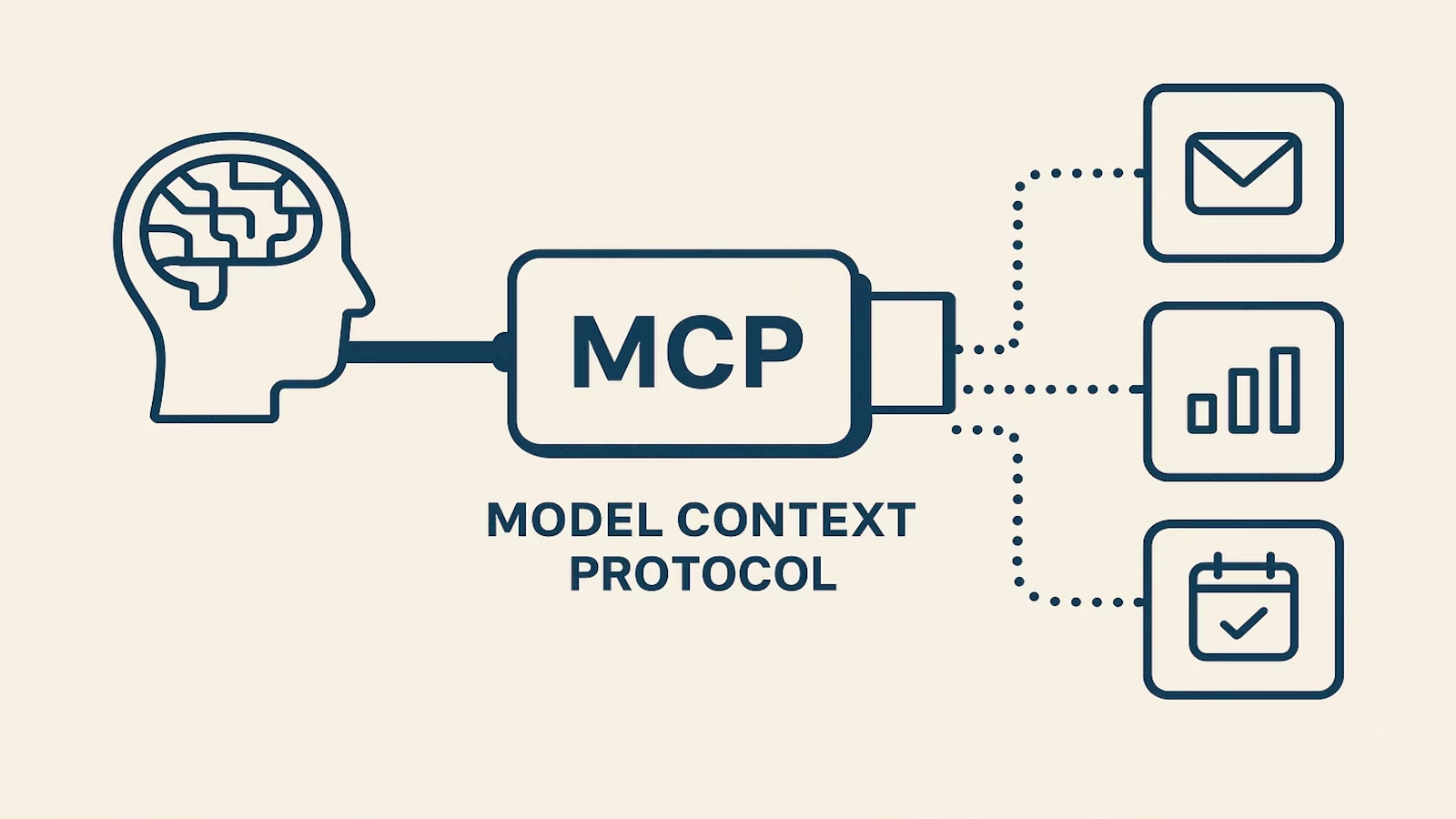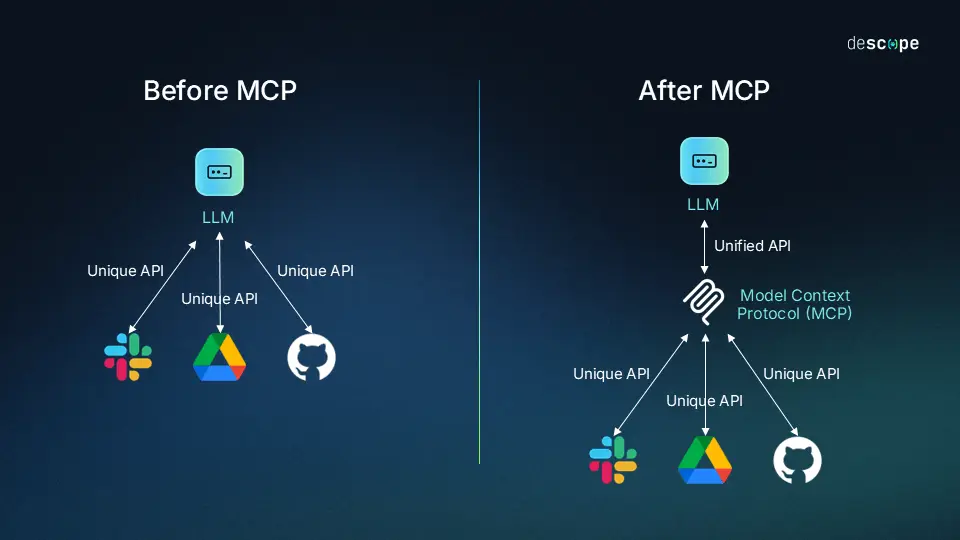The AI development landscape just experienced a major breakthrough with Klavis AI's official launch of their Python and TypeScript SDKs. We have made it significantly easier for developers to integrate powerful AI capabilities into their applications through production-ready Model Context Protocol (MCP) integrations.

What Makes Klavis AI Different?
Klavis AI addresses one of the most significant challenges in AI development: the complexity of connecting AI applications to external data sources and tools. Before MCP and solutions like Klavis AI, developers faced the time-consuming "N×M" problem of building custom connectors for every single integration.
The new SDKs provide several key advantages that distinguish them in the market:
- Production-Ready MCP Servers: Over 100 pre-built integrations including Gmail, GitHub, Slack, Discord, Shopify, and more
- Built-In Authentication: Secure OAuth flows and API key management handled automatically
- Instant Scalability: Infrastructure that scales to millions of users without additional setup
- Multi-Platform Support: Compatible with any LLM provider (OpenAI, Anthropic, Gemini) and AI framework (LangChain, LlamaIndex, CrewAI)
Getting Started with Python SDK
The Python SDK transforms AI integration from a complex process into a straightforward implementation. Installation requires just a simple pip command, followed by intuitive setup procedures.
Basic Installation and Setup
from klavis import Klavis
from klavis.types import McpServerName, ConnectionType
klavis_client = Klavis(api_key="your-klavis-key")
# Create a YouTube MCP server instance
youtube_server = klavis_client.mcp_server.create_server_instance(
server_name=McpServerName.YOUTUBE,
user_id="user123",
platform_name="MyApp",
connection_type=ConnectionType.STREAMABLE_HTTP,
)
Advanced OpenAI Integration
The Python SDK seamlessly integrates with OpenAI's function calling capabilities, enabling sophisticated AI workflows. Developers can create multi-step processes where AI models interact with external services through the MCP servers.
import json
from openai import OpenAI
from klavis import Klavis
from klavis.types import McpServerName, ConnectionType, ToolFormat
# Get available tools in OpenAI format
tools = klavis_client.mcp_server.list_tools(
server_url=youtube_server.server_url,
connection_type=ConnectionType.STREAMABLE_HTTP,
format=ToolFormat.OPENAI,
)
# Handle tool calls and process results
if response.choices[0].message.tool_calls:
for tool_call in response.choices[0].message.tool_calls:
result = klavis_client.mcp_server.call_tools(
server_url=youtube_server.server_url,
tool_name=tool_call.function.name,
tool_args=json.loads(tool_call.function.arguments)
)
TypeScript SDK
The TypeScript SDK brings identical functionality to the JavaScript ecosystem with comprehensive type safety. This approach ensures developers benefit from modern development practices while maintaining the same powerful integration capabilities.
Quick Start Implementation
import { KlavisClient, Klavis } from 'klavis';
const klavisClient = new KlavisClient({ apiKey: 'your-klavis-key' });
// Create Gmail MCP server with OAuth
const gmailServer = await klavisClient.mcpServer.createServerInstance({
serverName: Klavis.McpServerName.Gmail,
userId: "user123",
platformName: "MyApp",
connectionType: Klavis.ConnectionType.StreamableHttp
});
Multi-Service Workflows
The TypeScript SDK excels at orchestrating complex workflows that span multiple services. Developers can combine tools from different platforms, creating comprehensive AI agents that handle sophisticated business processes.
// Combine tools from multiple services
const githubTools = await klavisClient.mcpServer.listTools({
serverUrl: githubServer.serverUrl,
connectionType: Klavis.ConnectionType.StreamableHttp,
format: Klavis.ToolFormat.Openai
});
const slackTools = await klavisClient.mcpServer.listTools({
serverUrl: slackServer.serverUrl,
connectionType: Klavis.ConnectionType.StreamableHttp,
format: Klavis.ToolFormat.Openai
});
const allTools = [...githubTools.tools, ...slackTools.tools];
 Before and after MCP, Klavis AI is the fundamental infrastructure for AI integration
Before and after MCP, Klavis AI is the fundamental infrastructure for AI integration
Authentication Simplified
Authentication remains one of the most challenging aspects of API integrations, but Klavis AI streamlines this process through two primary approaches. OAuth services like Gmail and Google Drive receive automated URL generation, while API key services benefit from simplified token management.
For OAuth services, the SDKs automatically generate authorization URLs and handle the complete authentication flow. API key services require only a single method call to establish secure connections.
Enterprise-Ready Infrastructure
Klavis AI provides production-grade infrastructure out of the box:
- 99.9% Uptime SLA: Redundant systems and failover mechanisms
- Global Edge Network: Low-latency access worldwide
- SOC 2 Compliance: Enterprise security standards
- Real-time Monitoring: Built-in logging, metrics, and alerting
- Auto-scaling: Handle traffic spikes without configuration
The Future of AI Development
Klavis AI's Python and TypeScript SDK release marks a significant milestone in democratizing AI development. By eliminating integration complexity and providing production-ready infrastructure, these SDKs enable developers worldwide to build sophisticated AI applications without extensive backend development.
The timing aligns perfectly with broader AI trends toward reasoning capabilities, multimodal processing, and autonomous agents. With our open-source approach, Klavis is positioned to support the next generation of AI-powered applications across industries.
Community and Resources
Join the growing Klavis AI community:
- 🚀 Get Started - Sign up for free and get your API keys
- 📚 Documentation - Comprehensive guides and tutorials
- 🛠️ MCP Servers - Browse available integrations
- 💬 Discord Community - Connect with other developers
- 🐙 Open Source - Contribute to the codebase
